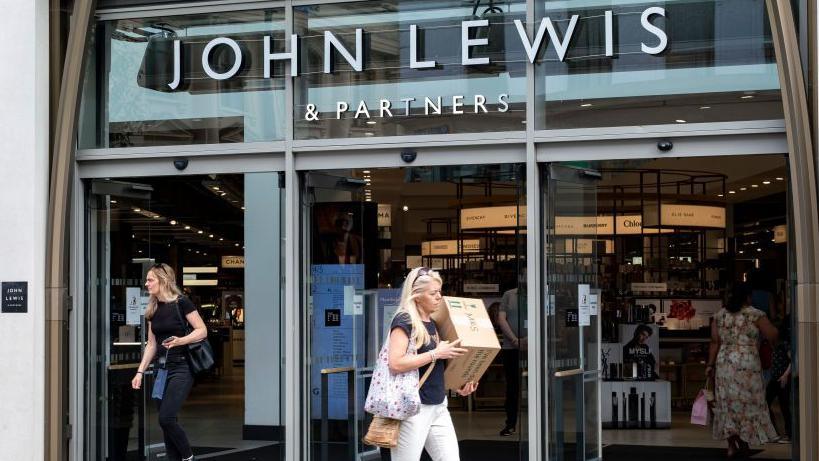John Lewis brings back 'never knowingly undersold'

- Published
Retailer John Lewis is bringing back its "never knowingly undersold" price pledge from Monday, two years after abandoning it.
It will also apply to online sales for the first time, whereas it previously only applied to in-store shopping, and will use AI to match the prices of 25 top retailers.
The department store chain has been trying to win back customers after a tough few years that has seen it cut jobs and close several stores.
It swung back to profit earlier this year, but is expected to continue shedding jobs as it seeks to revive its fortunes.
The decision by John Lewis' new managing director Peter Ruis to restore the price pledge marks a change of direction from his predecessor.
"When we removed the price promise, people automatically assumed that all prices went up... that wasn't necessarily the case," said Mr Ruis.
Mr Ruis said the pledge had not been "fit for purpose" in 2022, with staff relying on pencils, spreadsheets, and trips to other shops to keep track of rivals' prices.
There was "confusion" about how the century-old price pledge worked, he said, adding that it was based too much on a "pre-web world" where customers were local people.
His predecessor Pippa Wicks, who ended the pledge, said it at the time that it "doesn't fit with how customers shop today as more purchases are made online".
However, Mr Ruis said improvements in computing and artificial intelligence made the pledge more feasible.
The new version of the policy will only apply to branded products, with software tracking prices from competitors, including Marks & Spencer, House of Fraser, AO.com and technology products on Amazon.
Analyst Catherine Shuttleworth said the initial decision to scrap the pledge in a cost of living crisis was something "a lot of people were scratching their heads over".
She told the BBC the return of the price promise is a win for customers, but it is "impossible to predict" how much it will cost the retailer or whether it will help it win back customers.
"The challenge will be how easy shoppers find it to use it," she said.
Mr Ruis did not give a figure for the cost of reintroducing the pledge when asked by reporters on Thursday.
Bringing it back was one of his priorities after he joined in January, the retail veteran said.
John Lewis allowed to build homes for first time
- Published26 July 2024
John Lewis job applicants get questions beforehand
- Published26 April 2024
His appointment this year is his third stint at John Lewis, having previously been a director and a senior buyer at the retailer as well as chief executive of Jigsaw and Anthropologie.
The news comes as the High Street struggles to recover from the double-whammy of a pandemic and the rise of online shopping, with data from PwC revealing a net loss of 5,000 stores last year.
Rival department store chain Marks & Spencer has been axing 110 shops as part of a major overhaul, while Debenhams closed its final shop in 2021.
Debenhams has since been reborn as an online-only brand.
This is an increasingly common trend, with collapsed retailers Topshop, Cath Kidson, TM Lewin and several others also re-emerging as websites after collapsing as physical chains.
Topshop currently trades as part of the Asos website. However, on Thursday morning, Asos revealed plans to sell 75% of its stake in Topshop for £135m.
The new joint venture intends to relaunch TopShop.com as a standalone website within six months of the deal's completion.
Additional reporting by Emer Moreau